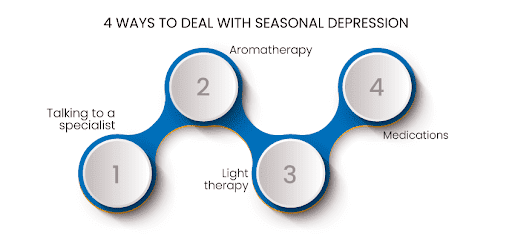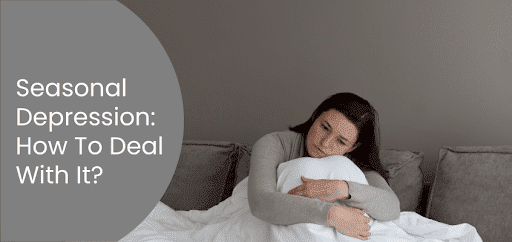Introduction
Have you ever noticed that someone around you becomes irritated easily, anxious, avoids socialising, and sleeps more than usual during the extreme winter or summer months? And you might also notice spontaneous remission or a pattern of occurrence of symptoms only during some months of the year. It may be a case of seasonal depression.
Our Wellness Programs
What is seasonal depression?
Seasonal depression is a subset of major depressive disorder (M.D.D.). Symptoms of depression occur according to changes in seasons of the year. Depression mainly occurs in individuals during the winter months. This disorder lasts 4-5 months and can cause an imbalance in the patient’s biological clock.
Looking for services related to this subject? Get in touch with these experts today!!
Experts

Neelam Parwani

India
Life Coach
Experience: 5 years

Mansi Chawla

India
Psychologist
Experience: 12 years

Sapna Zarwal

India
Psychologist
Experience: 19 years
What are the symptoms of seasonal depression?
General symptoms of seasonal depression include:
- Depression
- Lack of interest in any activity
- Difficulty in concentrating on the task at hand
- Suicidal tendencies and thoughts
- Difficulty in sleeping or excessive sleeping
- Fatigue or lack of energy
Types of seasonal depression
The two kinds of seasonal depression are:
- Winter pattern depression: Symptoms usually appear in the winter up to spring. These include excessive sleeping, lack of interest, overeating, weight gain, fatigue during the day, and lack of socialisation.
- Summer pattern depression: Depression occurs during the summer, including lack of appetite, weight loss, agitation, increased restlessness in every situation, difficulty sleeping, and violence.

Five ways to deal with seasonal depression
- Talking to a specialist (One can visit United We Care to speak to a specialist.)
- Aromatherapy
- Light therapy
- Medications
- Exercise your way out of seasonal depression
-
Talking to a specialist
: One can take the help of a psychologist or a psychiatrist to diagnose symptoms of seasonal depression and undergo appropriate treatment. A psychologist will ask you a set of questions to confirm seasonal depression. Cognitive behavioural therapy (C.B.T.) is increasingly used to overcome most forms of depression. Here, therapists guide people towards seeing the brighter side of life, being positive, taking up new initiatives for themselves, and overcoming negative, energy-consuming thoughts. In addition, a specialist’s help may overcome feelings of being lonely and suicidal thoughts.
One can visit United We Care to talk to a specialist.
-
Aromatherapy
: Aromatherapy is an excellent therapy for seasonal depression. You can use essential oils, aroma sticks, and candles to create a feel-good atmosphere in your house. Nowadays, people also make jewellery from essence materials that help the wearer elevate their mood. Practising mindfulness in this aromatic environment can prove beneficial.
-
Light therapy
: Photo devices and dawn simulators are trending and have been considered the first line of treatment for seasonal depression. Photo devices emit light radiations similar to sunlight. It makes you experience sunlight in the convenience of your home. One must sit in front of the device for at least 20-30 minutes. On the other hand, dawn simulators recreate the scenario of sunlight pouring into your room at dawn, which slowly increases in intensity. The device emits light and warmth while the power gradually increases. These devices have proven to be clinically helpful in treating depression.
-
Medications
: Doctors prescribe antidepressant drugs to manage seasonal depression in individuals when other forms of therapy do not work effectively to reduce symptoms. One should consult a healthcare provider and a psychiatrist before consuming any medicines.
-
Exercise your way out of seasonal depression
: Exercise is the most effective way to induce the production of serotonin, the happy hormones of our body. A light exercise such as walking, jogging, yoga, and pilates may help stimulate your body to function more efficiently. Serotonin causes reduced feeling of tiredness and promotes good thoughts about yourself and your surroundings. Indulging in 20-30 minutes of daily exercise can work wonders on your mind and body.
What is the difference between seasonal affective disorder and seasonal depression?
Seasonal affective disorder and seasonal depression are the same. The seasonal affective disorder is the scientific term included under the broad category of major depressive disorders. Depression, on the other hand, is a severe form of M.D.D., where symptoms do not subside with changes in the weather or season.
Seasonal depression is diagnosed with two primary criteria:
- Presence of seasonal depression symptoms for two consecutive years during the same time.
- In case of overlap of general depression and seasonal depression, the episodes of it may be more intense than non-seasonal depressive episodes.
When should you talk with your doctor?
- One can talk to a doctor or an expert for yourself or a loved one when the symptoms start interfering and causing trouble in your daily activities.
- Most individuals have a set pattern of symptoms that occur during the same time of the year. Therefore, you can talk to your doctor before the signs set in, which may help avert the onset of symptoms.
- In addition, preventive therapy may prove more beneficial as it allows the individual to prepare for the upcoming season, look at its brighter side, and save on expenses for medical treatment.
- For more details, visit United We Care!
Wrapping Up
However,r seasonal affective disorder or seasonal depression is a subset of major depressive disorders. Symptoms of depression are associated with a change in weather and season. People commonly notice these symptoms in the winter and summer months. These include agitation, lack of interest, excessive sleeping and eating, weight loss or gain, fatigue, and lack of socialisation. One can overcome it by undergoing cognitive behavioural therapy, light therapy, aromatherapy, mindfulness, and some form of exercise. However, the most important way to eliminate seasonal depression is to recognise your symptoms and prepare yourself before the season arrives.
















